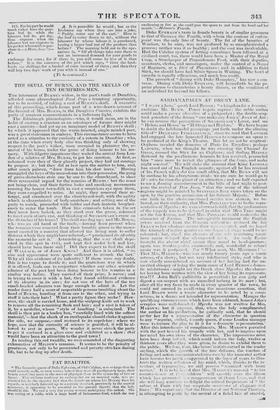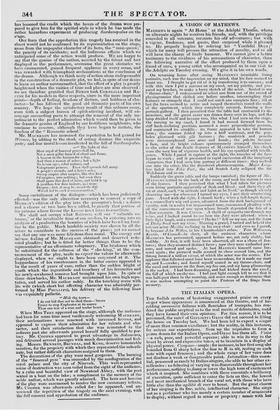I W . AT a hero," quell' Lor BRON; " a kingdom
for a heroine," forms part of a wire-drawn account of tred potentate of the drama " can make any Joan a" Java]. of Arc; The Edinburgh phrenologists—who, it would seem, are in the II—ades for even the ghost of an attraction ; and we half expected !
ELLEN to her admirers sooner than tv:1:; e:;p:ated, and we hoped the triumph of native genius on our le_•,,!,ra.], d A!age would be ac- celerated : but, alas! the abse rice of' our seh! rezoaining t ragic hero again Oolayed the off-cop:Tied toot. An early Easter brought the absent chief sooner than it to head-quarters: again was Sardow,p,das announced and, wonderful to relate! again was it postponed. For " What next, Mr. Merriman ?"— That Mrs. Manioc N—Who WaS nearly twenty years ago a comic actress, of a showy, but not very intellectual style, and who is now chiefly remembered on account of her having had the un- merited obloquy of being the main cause of Lord BYRON'S domes- tic misfortunes—might act the Greek slave Myi rho; the charac- ter having been written with the view of' her being its representa- tive!!! John Bull's gullibility is proverbial ; he can gulp and digest a sea-serpent with an unmelted iceberg in its maw : but, after all the wry faces he made in every quarter of the town, he could not succeed in swallowing the monstrous assertion, that Lord BYRON wrote a tragic character to acted by a comic actress, in a drama not intended for representation. Maugre the qualifying circurnsta eves, which have been adduced, honest John's scruples were well-fOu!itl,!1: Myrrha was not written for Mrs. Mattovo; but it appears, that, when the lady complimented the author on his !induction, he gallantly said, that he should prefer her for a representative of the character in question to any "regular, stilted, tragedy queen, if some London manager were to torture the play to lit it for a dramatic representation:. After this interchange of compliments, Mrs. MARDYN prevailed with the poet to read his tragedy with her, and to impress upon her mind his own ideas of the character. The impressions must have been deep indoed, which could induce the lady, twelve or thirteen years after they were given, to desire to exhibit them to time public. We fear, that, like lovers' initials carved in the tender sapling, which the growth of the tree deforms, the touches of feeling and action communicated rico yore by the immortal author have become too north exaggerated by the lapse of years to illus- trate the written effusions of his mind, whirl', thanks to the in- ventors of typograohy, ITC gill possess " unmixed with baser matter.- It is to hei d that Mrs. MAnnvv's removal " to her country-h,nuse " will speedily cure the illness
which has preventu 1 T reappearance at Diury Lane, and that
she will long continue to delight the critical frequenters of " tha safooa at Paris with her exquisite worrPan.r of elegance and fancy: We regret only t-liat the Director of our National Theatres, in attempting to profit by the revival of' a faded tae of scandal, has lessened the credit which the lovers of the drama were pre- pared to give him for the spirited style in which he has made the rather hazardous experiment of producing Sardanapalus on the stage.
Our fears that the approbation this tragedy has received in the closet would not he confirmed by its representation on the stage, arose from the unpopular character of its hero, the " man-queen ;" the paucity of its incidents ; and the ludicrous effects which we anticipated some of the action would produce. We are happy to say that the genius of the author, assisted by the talent and tact displayed in the performance, overcame the great obstacles we have enumerated, gained frequent applause in every scene, and was rewarded with triumphant acclamations at the conclusion of the drama. Although we think unity of action alone indispensable in the construction of a dramatic plot, we feel, in spite of our desire to leave an author untrammelled, that the effect of a play is greatly heightened when the unities of time and place are also observed : we are therefore gratified that BYRON took CORNEILLE and RA- CINE for his models in these respects, since in the more important points—depth of feeling, freedom of diction, and boldness of clia- racter—he has followed the good old dramatic poets of his own country. We hope the satisfactory result of this arduous essay, even with a subject barren of spirit-stirring incident, will en- corn age succeeding poets to attempt the removal of the only im- pediment to the perfect admiration which would then be given to the dramatic genius of England by our fastidious neighbours, who continue to censure, although they have begun to imitate, the freedom of the " Romantic school."
Mr. MACREADY has increased the reputation he bad gained for Werner, by adding to the stock of acting dramas the exquisite _poetry and fine moral lesson inculcated in the fall of Sardanapalus.
—" The light of this Most royal of funereal pyres shall be, Not a mere pillar form'd of cloud and flame, A beacon in the horizon for a day, And then a mount of ashes; but a light To lesson ages, rebel nations, and Voluptuous princes. Titre shall quench full many A people's records, and a hero's acts; Sweep empire after empire, like this first Of empires, into nothing ; but even then Shall spare this deed of mine, and hold it up A problem few dare imitate, ami none
Despise—but, it may he, amid the life
If'hich led to suck a consummation."
Some curtailment of the dialogue—which has been judiciously effected—was the only alteration necessary to convert a copy of MURRAY'S edition of the play into the prompter's book : a dance and a chorus or two have been added, to gratify that portion of his patrons whose favour the 1.esee most loves to conciliate. We shall not occupy what flatterers call our " valuable co- lumns," or the invaluable time of our readers, by entering into an analysis of a production the beauties of which have been long fami- liar to the public. Much laudable anxiety was shown by all the actors to contribute to the success of the piece ; yet we cannot say that any one was more felicitous than usual. The energy and intense feeling of Mr. MACREADY obtained and deserved reite- rated plaudits; but he is fitted for better things than to be the representative of an effeminate voluptuary. The briskness which he substituted for the softness of the " she-king," at the com- mencement of the play, made us elpect the valour he afterwards displayed, when we ought to have been surprised at it. The Laggardness of his countenance in the latter scenes appeared to be the result of years of care, rather than the sudden blight of youth which the ingratitude and treachery of his favourites and his newly-awakened remorse had brought upon him. In spite of these drawbacks Mr. MACREADY maintained his own high repu- tation, and served his author nobly. In the touching scene with his wife (which short but affecting character was admirably per- formed by Miss PHILLIPS), his delivery of the following lines was exquisitely pathetic.
"Hide thy tears—
I do not bid thee not to shed them—Were Easier to stop Euphrates at its source Than one tear of a true and tender heart."
When Miss TREE appeared on the stage, although the audience had been for some time most vociferously welcoming MACREADY, their acclamations were renewed with increased fervour, and appeared to express their admiration for her talents and cha- racter, and their satisfaction that she was reinstated in the arduous part she afterwards proved herself fully qualified to por- tray. Mr. COOPER appeared to great advantage in Salumenes, and delivered several passages with much discrimination and feel- ing. Messrs. BENNEIT, BRINDAL, and KING, deserve honourable mention, for the propriety with which they represented the subordi- nate, but rather difficult characters assigned to them.
The decorations of the play were most gorgeous. The burning af the "funereal pyre" was succeeded by the conflagration of the royal palace and the city of Nineveh. This well-represented scene of destruction was soon veiled from the sight of the audience, by a calm and beautiful view of Newstead Abbey, with the poet seated in a boat on the lake; a compliment to the memory of the noble author, which was greatly admired. The hero and heroine af the play were summoned to receive the now customary tribute. Mr. COOPER was afterwards called for : he appeared, and an- wowed the repetition of the tragedy on the next evening, with She full consent and approbation of the audience. •





















 Previous page
Previous page